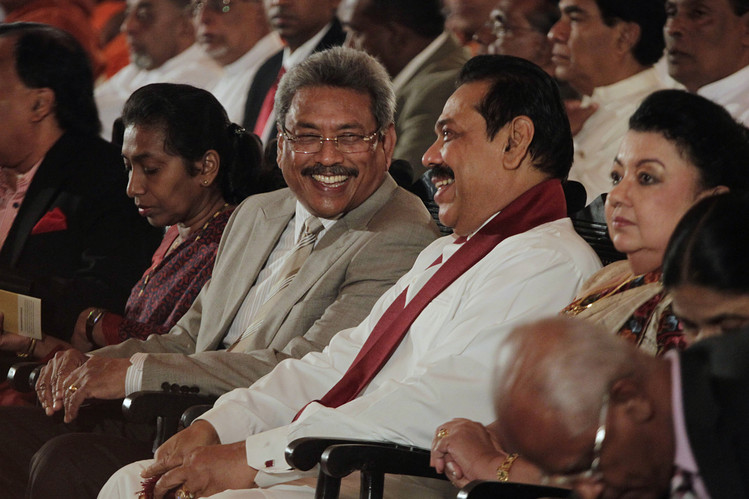by Razeen Sally, ‘The Wall Street Journal,’ New York, December 15, 2014
When President Mahinda Rajapaksa called a snap election last month in Sri Lanka, it appeared he would cruise to a third term. But a hitherto feeble and divided opposition has since rallied behind a common presidential candidate for the Jan. 8 vote. Only a month ago, Maithripala Sirisena was a cabinet minister and general-secretary of the ruling party. Now suddenly Sri Lanka could be at a turning point after almost a decade of Rajapaksa rule.
The president is campaigning on his economic record after comprehensively defeating the Tamil Tigers in 2009. And on the surface, Sri Lanka looks a lot better off for his leadership. After a quarter-century of civil war, people can go about their daily lives without fear.
Roads, bridges, railways and power projects have come to fruition. Colombo and many other towns have been beautified. Tourism has bounced back, with postwar arrivals hitting all-time highs.
But this surface reality is deceptive. Things have gone terribly wrong with Sri Lanka’s politics, ethnic relations, economy and foreign policy.
Politically, Sri Lanka has become a one-family show. It is run by a quartet: the president; his two brothers, Gotabhaya and Basil; and his son Namal. Then there is the rest of Rajapaksa clan, an outer circle of relatives and hangers-on, where conflicts of interest abound.
Policy making is extremely populist and ad hoc, hostage to the whims of a few individuals. The civil service, legislature, judiciary, local government, police and military have been co-opted. Likewise business, the media and nongovernmental organizations have been cowed.

BROTHERLY LOVE: President Mahinda Rajapaksa (in white and wearing a scarf) rules the country with his son and two brothers, including Defense Secretary Gotabhaya Rajapaksa (to his right), and assorted members of the Rajapaksa clan. ASSOCIATED PRESS
In short, Sri Lanka has become an illiberal democracy, more like Russia or Venezuela than its subcontinent peers.
Ethnic relations have not improved since the war ended. The war-scarred north and east, where Tamils are the majority, may have better infrastructure, more commercial life and new refugee housing. But war-related poverty and psychosocial problems are still acute.
The military presence remains oppressive, especially in the north. Boddhu Bala Sena, an organization led by Buddhist monks, has attacked mosques and Muslim shops, and even a few Christian churches. The problem is a Sinhala-Buddhist chauvinism that is more extreme than ever and seems to be encouraged by the Rajapaksa government to shore up its Sinhala vote base.
At first glance, Mr. Rajapaksa’s economic record is stellar. Growth has averaged more than 7% since the war. Inflation, the budget deficit, public debt and interest rates have all come down. Extreme poverty has come crashing down, and so has unemployment.
To be sure, the government’s headline economic numbers are exaggerated, as many serious observers have pointed out. But this masks something more alarming. Postwar growth is debt-fuelled and driven by an expanding, inefficient public sector, not by productivity gains. A borrowing spree finances fiscal largesse, and it increases reliance on volatile international capital markets for debt financing.
Highly interventionist microeconomic policies favor subsidized and loss-making domestic industries. Trade protectionism has increased, competitiveness has declined and foreign investment is stagnant. Infrastructure projects have had massive cost overruns.
Meanwhile the defense budget has increased and the military has diversified into business activities.
There is widespread perception that the benefits of growth have accrued disproportionately to those with privileged political access.
Foreign policy follows in the footsteps of illiberal democracy and economic nationalism. Relations with Western powers have deteriorated and remain testy with India. But China has emerged as Sri Lanka’s “first friend.” Chinese loans pay for much of Sri Lanka’s new infrastructure and Rajapaksa vanity projects.
The Rajapaksa slant on foreign policy runs directly counter to Sri Lanka’s global economic interests. The U.S. and European Union account for two-thirds of Sri Lankan exports. Sri Lanka has everything to gain from closer economic relations with India, particularly with the four states of neighboring South India that constitute a market of 300 million people.
If President Rajapaksa wins on Jan. 8, Sri Lanka is set for a further slide into authoritarianism, Sinhala-Buddhist chauvinism and ethnic strife, combined with economic nationalism and dependence on China. Debt-fuelled growth will inevitably lead to a reckoning.
Mr. Sirisena promises to abolish the executive presidency within 100 days, form an all-party government, restore a Westminster-style parliamentary system and re-establish the independence of institutions such as the police, judiciary and public service. These are all laudable objectives. The country desperately needs to return to credible public institutions and the rule of law. But the anti-Rajapaksa opposition also has its share of authoritarian elements.
The opposition’s terse “Common Programme” is purposely silent on ethnic relations, since it, too, includes Sinhala-Buddhist chauvinists in its broad tent. Those who favor genuine ethnic reconciliation will have to fight their corner. Long-delayed devolution of powers to provincial councils, including those in the north and east, is part of the solution.
The opposition platform is decidedly interventionist on the economy. This makes it all the more urgent for Sri Lanka’s tiny number of economic liberals to make the case for a radical economic overhaul. Priorities should include the repair of public finances; domestic deregulation to liberate the private sector; trade liberalization and an open door to foreign investment; public-sector reform; and lower defense spending. This should be complemented by a reorientation in foreign policy, emphasizing better relations with the West and India.
Sri Lanka needs more political and economic liberalism as an antidote to the politicization of practically everything. An opposition victory on Jan. 8 would be a welcome turning point. But it would be just the beginning of the battle for freer Sri Lanka.
Mr. Sally is associate professor at the Lee Kuan Yew School of Public Policy, National University of Singapore.
http://www.wsj.com/articles/razeen-sally-a-chance-to-close-sri-lankas-one-family-show-1418665427
———–